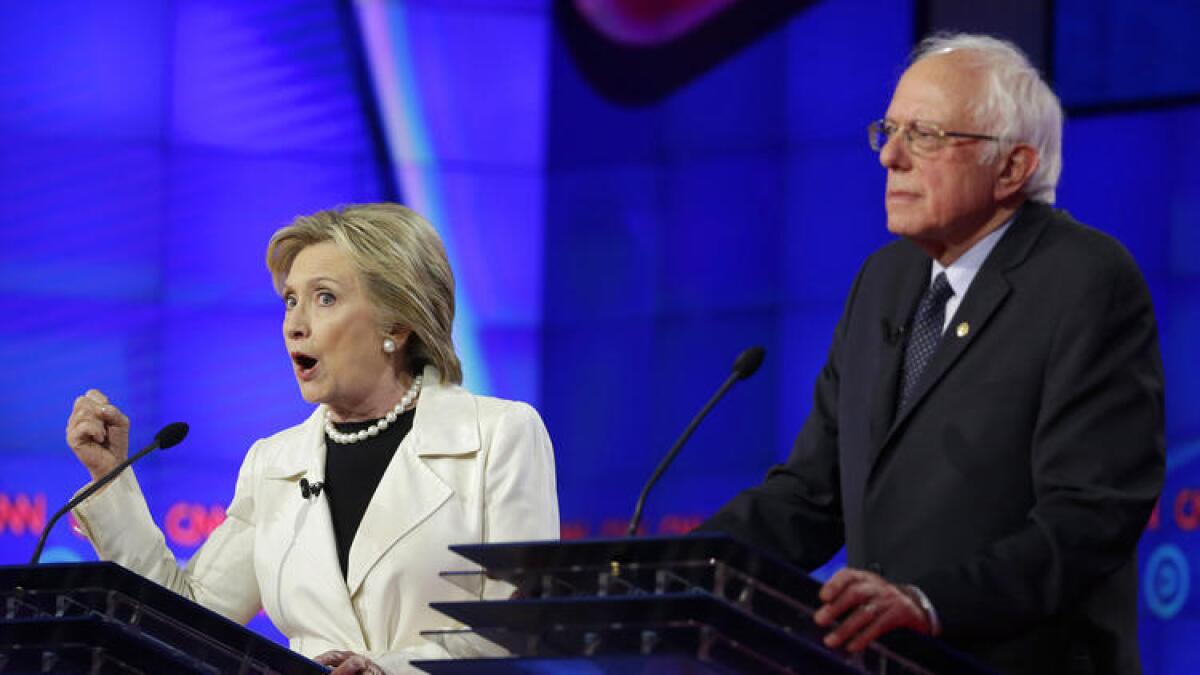Opinion: No sane judge would pass Bernie Sanders’ Supreme Court litmus test

Hillary Clinton and Bernie Sanders participate in Thursday’s Democratic presidential debate in Brooklyn, N.Y.
- Share via
It’s 2005. After Supreme Court Justice Sandra Day O’Connor announces that she plans to resign. President George W. Bush tells the press that anyone he nominates to succeed O’Connor will “make it crystal clear that he or she will vote to overturn Roe vs. Wade.”
Imagine the howls of outrage. It’s hard to believe even a single Democratic senator would vote for a nominee who made such a promise in exchange for a seat on the Supreme Court. Even some Republican senators might balk at confirming a judge who promised to vote a certain way.
You would hear a lot of senators quoting this statement by Justice Ruth Bader Ginsburg at her confirmation hearings in 1993:
“It would be wrong for me to say or preview in this legislative chamber how I would cast my vote on questions the Supreme Court may be called upon to decide. A judge sworn to decide impartially can offer no forecasts, no hints, for that would show not only disregard for the specifics of the particular case, it would display disdain for the entire judicial process.”
Subsequent nominees appointed by presidents of both parties have generally hewed to Ginsburg’s policy of “no forecasts, no hints.” And presidents haven’t attempted to secure such promises.
Enter Bernie Sanders. At Thursday’s debate with Hillary Clinton in Brooklyn, N.Y., Sanders reiterated his longstanding view that he would demand not a hint or a promise but a public commitment that any Supreme Court nominee would vote to overturn a precedent Sanders doesn’t like.
Sanders was asked if he would ask President Obama to withdraw his nomination of Judge Merrick Garland if Sanders won the election. Sanders answered yes and added this:
“I think that we need a Supreme Court justice who will make it crystal clear, and this nominee has not yet done that, crystal clear that he or she will vote to overturn Citizens United and make sure that American democracy is not undermined.”
Whoa.
This statement is shocking less because Sanders would be asking a nominee to behave unethically than for what it shows about Sanders’ understanding of politics.
A Supreme Court nominee who promised to vote a certain way would almost certainly be unconfirmable and probably would be rated unqualified by the American Bar Assn. In the unlikely event that such a nominee were confirmed, he or she would (rightly) be pressed not to participate in any case that might put Citizens United in jeopardy.
To be fair, Hillary Clinton flirted with the idea of a litmus test -- actually two litmus tests -- in the debate. She said:
“You know, there is no doubt that the only people that I would ever appoint to the Supreme Court are people who believe that Roe vs. Wade is settled law and Citizens United needs to be overturned.” But Clinton didn’t say she would require a public promise from a nominee that he or she would vote to reaffirm Roe vs. Wade or overrule Citizens United.
Also, in describing Roe as “settled law,” she acknowledged that a nominee could say that Roe was “settled law” without promising never to consider arguments that it ought to be overruled or revised. That’s essentially what Chief Justice John G. Roberts Jr. said at his confirmation hearings under dogged questioning from the late Sen. Arlen Specter.
A prospective Supreme Court nominee might be willing to say whether he or she believed the same about Citizens United (a much more recent decision than Roe vs. Wade and arguably less “settled” as a precedent). But a public promise to overturn it? No lawyer in his or her right mind would make such a commitment to a president or to the Senate.
Sanders’ defenders will say that he is just being honest about having a litmus test for Supreme Court nominees, whereas other candidates (and presidents) are just as determined to apply such a test but dissemble about doing so.
Sorry, but there’s a big difference between choosing a nominee you suspect might share your views about Roe vs. Wade or Citizens United and demanding a promise that the nominee would vote to reverse a ruling. The latter approach is not just politically stupid; it undermines the independence of the judiciary.
Someone as experienced in politics as Sanders should know the difference.
Twitter: @MichaelMcGough3
More to Read
A cure for the common opinion
Get thought-provoking perspectives with our weekly newsletter.
You may occasionally receive promotional content from the Los Angeles Times.











